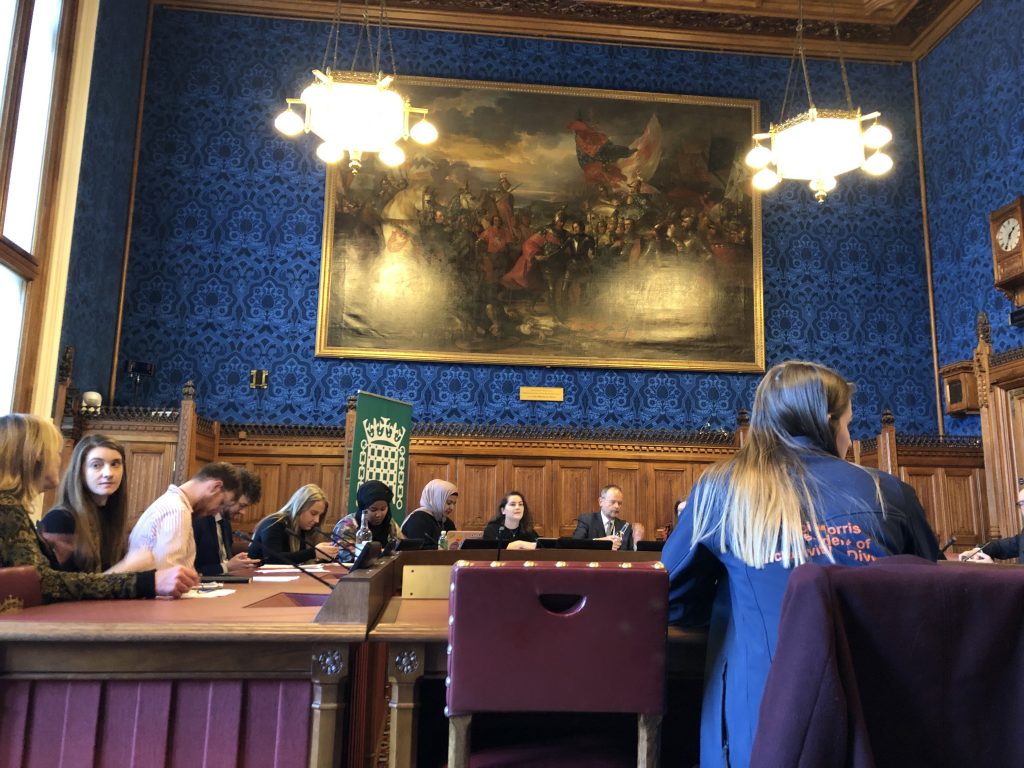All Party Parliamentary Group on Students
Tuesday 28 January 2020 | House of Lords
Alongside my Board colleague Mark Hollingsworth I was delighted to have the chance to attend the All Party Parliamentary Group (APPG) on Students at the House of Lords. In Brexit week, the building was surprisingly serene, with the peace only shattered by occasional school groups passing through.

Department Manager
University of York
The focus of the session was student mental health, and students’ union sabbatical officers from around the country had convened to meet with MPs to share their experiences. We were also joined by Rosie Tressler OBE (CEO of Student Minds) as well as colleagues from the NUS and other sector bodies.
Some of the statistics outlined by the APPG in their introductory papers were quite shocking, though sadly likely to be unsurprising for anybody working with students in the sector:
- 95% of higher education providers has reported an increase in demand for counselling services
- The number of students declaring a pre-existing mental illness to their university has more than doubled since 2014/15
- 87% of students in HE and FE have felt stressed; 77% have suffered from anxiety and 33% had had suicidal thoughts, in a 2015 NUS survey.
Rosie outlined the story behind the University Mental Health Charter and the development of the Charter Award Scheme being developed in 2020. The Charter is a comprehensive, academically rigorous document, co-produced between students, universities, and partners, under the leadership of Student Minds. While focussed on the sector, it is clear that the knock-on effects for improving support for students is huge; developing an effective model for mental health support will be of benefit far beyond our campuses. Discussion covered a wide range of areas relating to student mental health, including eye-opening stories about the disclosures that students union officers face. One frustration that came across loud and clear from students was a feeling that universities sometimes pay lip service to wellbeing support, promising it will be their top priority will reducing spending in these areas; the students appealed to the OfS to hold universities accountable for the service they provide.
There was some acknowledgement, however, that some of this burden arises from NHS funding cuts and an ability for the health service to deal with difficulties quickly. I couldn’t help reflecting that while universities should do all they can to try to support students, it isn’t what we’re best or most efficient at, and society may need to ask itself some difficult questions about how we fund these services more generally.
The cost of living for students was raised as a contributing factor to mental ill health that universities may have some control over; stress about finances was shown to have a significant impact on IQ. Here the OfS drew ire for encouraging students from widening participation backgrounds into universities but without insisting that institutions provide the support that they will need when they arrive. This was an example of ways in which the sector may need to implement more systemic change rather than (or in addition to) providing individual student support. Students felt particularly patronised by the suggestion that those experiencing mental health crises simply needed to develop a greater level of resilience. They also felt (as I’m sure many of us do!) that universities are painfully slow to make decisions and implement meaningful change.
The Mental Health Charter considers staff, as well as student, needs. It was noted that staff who may not be trained are frequently receiving disclosures from students, and this is adding further pressure to them on top of their increasingly busy and stressful roles. Universities were urged to think about this more carefully and to provide adequate support to these staff, both for its own sake and to improve the ability of those staff to effectively respond to students.
Rosie concluded her opening by looking forward ten years – where she hopes universities across the country will have achieved charter award status and meaningful reductions in the number of students whose mental ill health spoils their university experience, or worse.
To find out more about the APPG on Students, you can contact the Secretariat to the APPG: info@appg-students.org.uk.



If you would like to know more about how you can help support student mental health and wellbeing, have a look at our one day event, Managing Distressed Students.

0 comments on “All Party Parliamentary Group on Students”